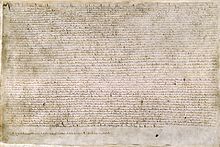I’m going to let somebody else do the heavy lifting today. My  nephew and godson James Green has won first prize in the One Essex Court/Times essay competition, with this essay. The subject of the competition’s essays was: “Is Magna Carta more honoured in the breach?”. The essay is about the same length as one of my normal posts, and at least as well written – do read it!
nephew and godson James Green has won first prize in the One Essex Court/Times essay competition, with this essay. The subject of the competition’s essays was: “Is Magna Carta more honoured in the breach?”. The essay is about the same length as one of my normal posts, and at least as well written – do read it!
James makes the point that Magna Carta’s main purpose was to challenge King John’s sovereignty, and set limits to it. Today the concept of sovereignty in Britain rests not with the King or Queen, but with Parliament. The European Convention on Human Rights (ECHR), enshrined in British law by the Human Rights Act, was drafted mainly by British lawyers and likewise seeks to set limits on Parliamentary sovereignty. It can be said to be the true successor of the Magna Carta. The British Bill of Rights, an alternative to the Human Rights Act postulated by the Conservatives, seeks to restore the sovereignty of Parliament – or that appears to be the case from the drafts seen so far.
Parliament claims sovereignty based on the will of the people. King John claimed his based on the will of God. King John’s claim may be the more flawed in modern eyes, but the two claims aren’t as different as we often like to suppose. Parliament is a collection of men and women with there own agendas and interests, and elections (which do not apply to the House of Lords anyway) are but an imperfect check. Almost every other democracy places their legislature in check with some form of written constitution. We have the ECHR and not much else. As I think Lord Hailsham put it (speaking as a Tory peer under a Labour government) we live not in a democracy but in an elective dictatorship.
Imposing a written constitution on the deeply conservative British system is probably too big an ask, in the absence of a major breakdown. So in the meantime let’s celebrate the 800th anniversary of the Magna Carta by affirming our commitment to the ECHR.